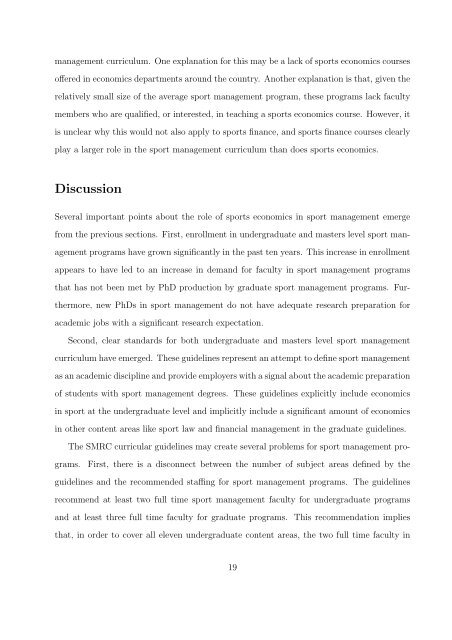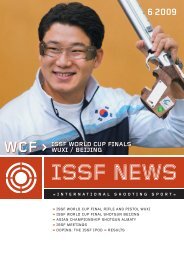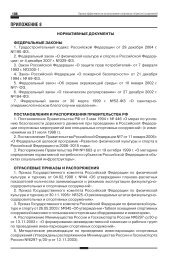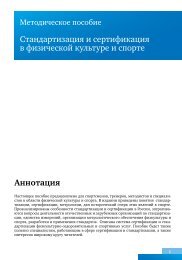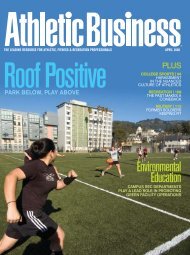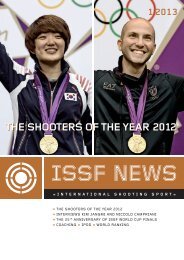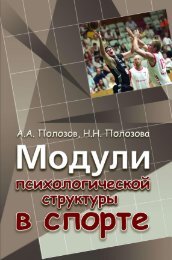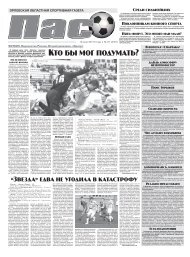The Role of Sports Economics in the Sport Management Curriculum
The Role of Sports Economics in the Sport Management Curriculum
The Role of Sports Economics in the Sport Management Curriculum
Create successful ePaper yourself
Turn your PDF publications into a flip-book with our unique Google optimized e-Paper software.
management curriculum. One explanation for this may be a lack <strong>of</strong> sports economics courses<br />
<strong>of</strong>fered <strong>in</strong> economics departments around <strong>the</strong> country. Ano<strong>the</strong>r explanation is that, given <strong>the</strong><br />
relatively small size <strong>of</strong> <strong>the</strong> average sport management program, <strong>the</strong>se programs lack faculty<br />
members who are qualified, or <strong>in</strong>terested, <strong>in</strong> teach<strong>in</strong>g a sports economics course. However, it<br />
is unclear why this would not also apply to sports f<strong>in</strong>ance, and sports f<strong>in</strong>ance courses clearly<br />
play a larger role <strong>in</strong> <strong>the</strong> sport management curriculum than does sports economics.<br />
Discussion<br />
Several important po<strong>in</strong>ts about <strong>the</strong> role <strong>of</strong> sports economics <strong>in</strong> sport management emerge<br />
from <strong>the</strong> previous sections. First, enrollment <strong>in</strong> undergraduate and masters level sport man-<br />
agement programs have grown significantly <strong>in</strong> <strong>the</strong> past ten years. This <strong>in</strong>crease <strong>in</strong> enrollment<br />
appears to have led to an <strong>in</strong>crease <strong>in</strong> demand for faculty <strong>in</strong> sport management programs<br />
that has not been met by PhD production by graduate sport management programs. Fur-<br />
<strong>the</strong>rmore, new PhDs <strong>in</strong> sport management do not have adequate research preparation for<br />
academic jobs with a significant research expectation.<br />
Second, clear standards for both undergraduate and masters level sport management<br />
curriculum have emerged. <strong>The</strong>se guidel<strong>in</strong>es represent an attempt to def<strong>in</strong>e sport management<br />
as an academic discipl<strong>in</strong>e and provide employers with a signal about <strong>the</strong> academic preparation<br />
<strong>of</strong> students with sport management degrees. <strong>The</strong>se guidel<strong>in</strong>es explicitly <strong>in</strong>clude economics<br />
<strong>in</strong> sport at <strong>the</strong> undergraduate level and implicitly <strong>in</strong>clude a significant amount <strong>of</strong> economics<br />
<strong>in</strong> o<strong>the</strong>r content areas like sport law and f<strong>in</strong>ancial management <strong>in</strong> <strong>the</strong> graduate guidel<strong>in</strong>es.<br />
<strong>The</strong> SMRC curricular guidel<strong>in</strong>es may create several problems for sport management pro-<br />
grams. First, <strong>the</strong>re is a disconnect between <strong>the</strong> number <strong>of</strong> subject areas def<strong>in</strong>ed by <strong>the</strong><br />
guidel<strong>in</strong>es and <strong>the</strong> recommended staff<strong>in</strong>g for sport management programs. <strong>The</strong> guidel<strong>in</strong>es<br />
recommend at least two full time sport management faculty for undergraduate programs<br />
and at least three full time faculty for graduate programs. This recommendation implies<br />
that, <strong>in</strong> order to cover all eleven undergraduate content areas, <strong>the</strong> two full time faculty <strong>in</strong><br />
19


